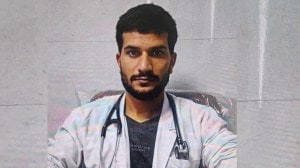Some Indians stay back in Bangladesh by choice, some due to compulsion
At the all-party meeting, the Opposition parties are understood to have expressed support to the government on the issue.
 (AP Photo)
(AP Photo)In the riot-hit streets of Old Dhaka’s Kolta Bazar in Bangladesh, a 24-year-old medical intern from Surat, Gujarat, clutches his ID card like a lifeline. “It’s our curfew pass,” he explains, as he makes his way to the hospital where he works.
Explaining why he stayed back despite the political turmoil and a potential threat to his well being, the intern at Dhaka National Medical College, who did not wish to be identified, said, “I am of course worried about my safety but I am doing my duty as promised. Serving the people is the need of the hour, which is why I decided to stay on.”
He said that at the moment, “Indians are mostly safe”.
Since the unrest began last month, thousands of Indian students have crossed the borders Bangladesh shares with Meghalaya and West Bengal or boarded flights from Dhaka, booked with the help of their families back home. In a statement issued on July 21, the Ministry of External Affairs had said that over 4,500 Indian nationals had returned so far from Bangladesh.
But some Indian medical interns chose to stay back – and are now among those tending to injuries at the Dhaka National Medical College.
Munawar Abbas, a 25-year-old from Kashmir, recalled seeing vandalised police stations and street fights between former ruling party members and locals.
Abbas, who is a medical intern and the admin of the Affiliation of Indian Medical Students in Bangladesh, said, “Although medical colleges across Dhaka have issued orders that they will resume full functioning from August 10, looking at the current situation, we advised students (juniors) to assess the stability of the new regime before they decide to come back and continue with their classes.”
“No Indians have been attacked, but most students have left. We interns stayed to avoid a setback in our careers. The college has been great, helping others evacuate safely. I’m hopeful things will settle down soon,” he said.
At Dhanmondi in Dhaka, 25-year-old Mohammad Farhan, who hails from Madhubani in Bihar and has been a student at Green Life Medical College for the past six years, said the situation is relatively calmer in his area.
“The embassy and our college both have issued guidelines to Indian nationals not to get out of their residences and campuses. Although the state announced a curfew, we were given time slots to go out and get supplies from the market,” he said.
Suleman Haque Sahil from Patna, who is a student of Dhaka’s Green Life Medical College & Hospital, said: “We, as Indian students, don’t have any political view — in favour or against anything happening in Bangladesh at present. The only thing we pray for is a peaceful environment for all of us…we have been living here in absolute harmony with local friends.”
Sahil’s classmate Rishabh Chatterjee, who is from Kolkata’s Park Circus, said: “Bangladesh as a country has always been good to live in… To be honest, when I got admission in the medical college, I was apprehensive but the country has been warm and welcoming.”
Away from the world of medicine, men like Ratikanta Mondol (41), who came to the country from West Bengal to make a living, were more concerned for their safety. “We are scared. We just want to return home,” said Mondol, who hails from Gopalnagar village in Singur, and works in Dhaka as an artisan making imitation jewellery.
“We are not leaving our rented room. A two-minute walk from here, you can see the mayhem,” he said, adding that his neighbours have been a constant support.
A State Bank of India staffer, originally from West Bengal’s South 24 Parganas, said those with families are particularly worried and are in touch with the embassy for a way out.
Premnath Baur, a 31-year-old from Howrah who went to Dhaka three months ago, said they are also having to contend with a constant flow of information and misinformation. “We keep getting news that houses have been ransacked, people killed. We don’t know how many days we have to stay here. Our company told us they will provide a vehicle to take us to the border. As soon as they do, we are out of here,” he said.







